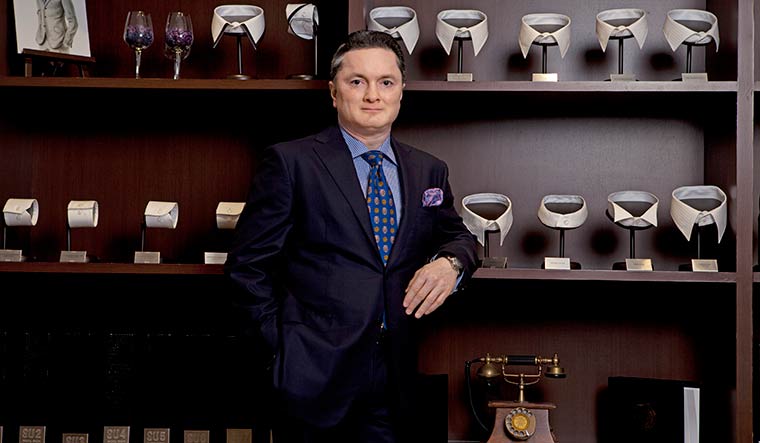GAUTAM SINGHANIA’S physical store-focused retail businesses might have taken a hit by the Covid-19 restrictions, but he remains upbeat about future prospects. Happy with the direction of the latest Union budget and the incentives for textile parks, the Raymond tycoon is not overtly perturbed by the e-commerce wave, with markets opening up, businesses recovering and sentiments on an upward trajectory. Excerpts from an interview:
Q/What challenges did Covid-19 bring for the retail industry?
A/There was a countrywide lockdown, businesses were shut, we really could do nothing. There were no challenges—the whole country was in lockdown! Now that the country has come out of the lockdown, we are seeing very good positive traction out of this.
Again, I would say, some of our businesses are higher than pre-Covid levels, some are at pre-Covid levels. Mostly all our businesses are overriding the Covid levels, which is a good sign.
Q/What are your thoughts on Atmanirbhar Bharat, and how exactly can Raymond contribute?
A/We’ve always supported ‘be Indian, buy Indian’. The world is moving to a more localised economy. If you see, on a micro-level, there is no cross-border movement. If you take the Middle Eastern airlines, the traffic is down to 10 or 12 per cent. Ninety per cent of the world is not travelling. Leave alone someone coming from Delhi to Bombay to meet me, you won’t come from your house to my house and meet! That is how much travel has come down. And that has its own implications.
We are all struggling to live currently to live within our means. And not just India, every single economy in the world has a problem.
Q/Atmanirbhar Bharat also means you woo the world. You make India a global brand, go out and capture business.
A/First, you must be successful within your country. Then you can go out and attack the world! There is a huge negative sentiment against China. How do you leverage on that? This opportunity may not come again in your life. We need to capitalise on it.
Q/Raymond has invested a lot in physical stores across the country. Considering the trend towards buying online, is there a re-thinking on this?
A/Please understand one thing—shopping is still an experience. People like to go out. Go for an outing, watch a movie, shop, eat out—this is Indian culture.
People like to go to a shop. It is a touch-feel business. Let me give you an example. Today, it is easy for me to buy a Ferrari on the internet. Very easy, because it is a commodity. But the whole experience of going to a Ferrari outlet and spec-ing it there is an experience which digital cannot replace. They’ll offer you champagne, serve canapés. They woo you. That is part of the buying experience.
When you come to the Raymond shop, a salesperson will drape the fabric on you, see how you feel. You touch the fabric, feel the fabric. You like it, you don’t like it. You have friends with you, you spend time there. It is an experience. You can’t digitise that experience.
[Also, on digital], the chances of getting products which are not good is very high. For example, I bought an AirPods case. It came after three months, but it was broken. For four dollars, who’s going to go and return it? But the fact is that the product was rubbish. So, you don’t want to take a chance. I bought a T-shirt recently. It (was) ten-inches (too) long for me, going half-way down my thigh! I told my [help] to cut it with scissors!
Q/You are extremely optimistic about the prospects of the whole retail segment, and particularly going forward.
A/Absolutely.
Q/What do you think the government can do to help the overall cause of business?
A/I think the banking system needs to support the industry, and not just go by what the rating agencies say. We have been through an unprecedented period. There was nothing you or I could predict. If you ask which company will get downgraded, every company will get downgraded. This is the time for the banks to come forward and support the industry, and say ‘we are willing to support you’. Put money into the system.


